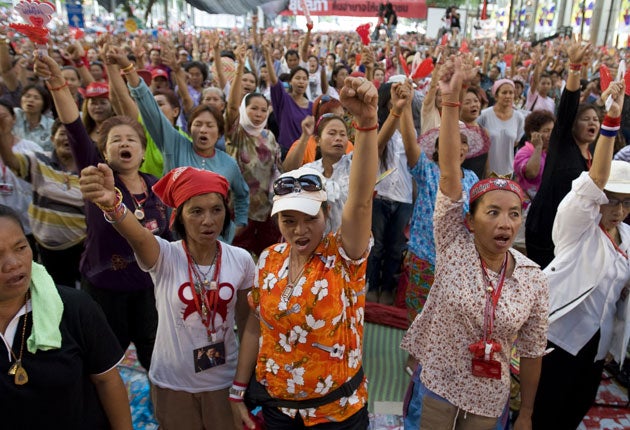Thailand crisis deepens as Red Shirts prolong protests

Your support helps us to tell the story
From reproductive rights to climate change to Big Tech, The Independent is on the ground when the story is developing. Whether it's investigating the financials of Elon Musk's pro-Trump PAC or producing our latest documentary, 'The A Word', which shines a light on the American women fighting for reproductive rights, we know how important it is to parse out the facts from the messaging.
At such a critical moment in US history, we need reporters on the ground. Your donation allows us to keep sending journalists to speak to both sides of the story.
The Independent is trusted by Americans across the entire political spectrum. And unlike many other quality news outlets, we choose not to lock Americans out of our reporting and analysis with paywalls. We believe quality journalism should be available to everyone, paid for by those who can afford it.
Your support makes all the difference.Anti-government protesters encamped for weeks in central Bangkok promised more aggressive measures after the government rejected their proposals to end increasingly violent protests in return for early polls.
Red Shirt protest leaders called on their supporters in the countryside to confront the army and police. Their backers responded by blockading police convoys in at least two areas, raising questions over whether the prime minister Abhisit Vejjajiva can exert full control over rebellious parts of Thailand as the deadly protests entered a seventh week.
About 310 miles north of Bangkok, hundreds of Red Shirts formed a roadblock in Udon Thani province to stop a convoy of 150 police from heading to the capital. They formed another roadblock in Pathum Thani, about 30 miles north of Bangkok, preventing around 200 policemen from entering the city. Police reinforcements are being brought into the capital to disperse thousands of protesters, said Red Shirt leader Jatuporn Prompan. "We will try to block every spot we can in a bid to stop killing. We don't want to see anybody die."
The army's failed attempt to eject Red Shirts from another site in Bangkok on 10 April led to clashes that killed 25 and wounded more than 800.
Mr Abhisit, speaking yesterday in a televised interview – together with the army chief Anupong Paochinda in a show of solidarity with the military – flatly rejected a red shirt offer to call elections in 30 days and hold a vote 60 days later.
The developments rekindled fears of more unrest and a heavier toll on Southeast Asia's second-biggest economy as more retailers shut their doors and tourist numbers dwindled. Mr Abhisit said he would soon scale back Thailand's annual economic growth forecast.
Join our commenting forum
Join thought-provoking conversations, follow other Independent readers and see their replies
Comments